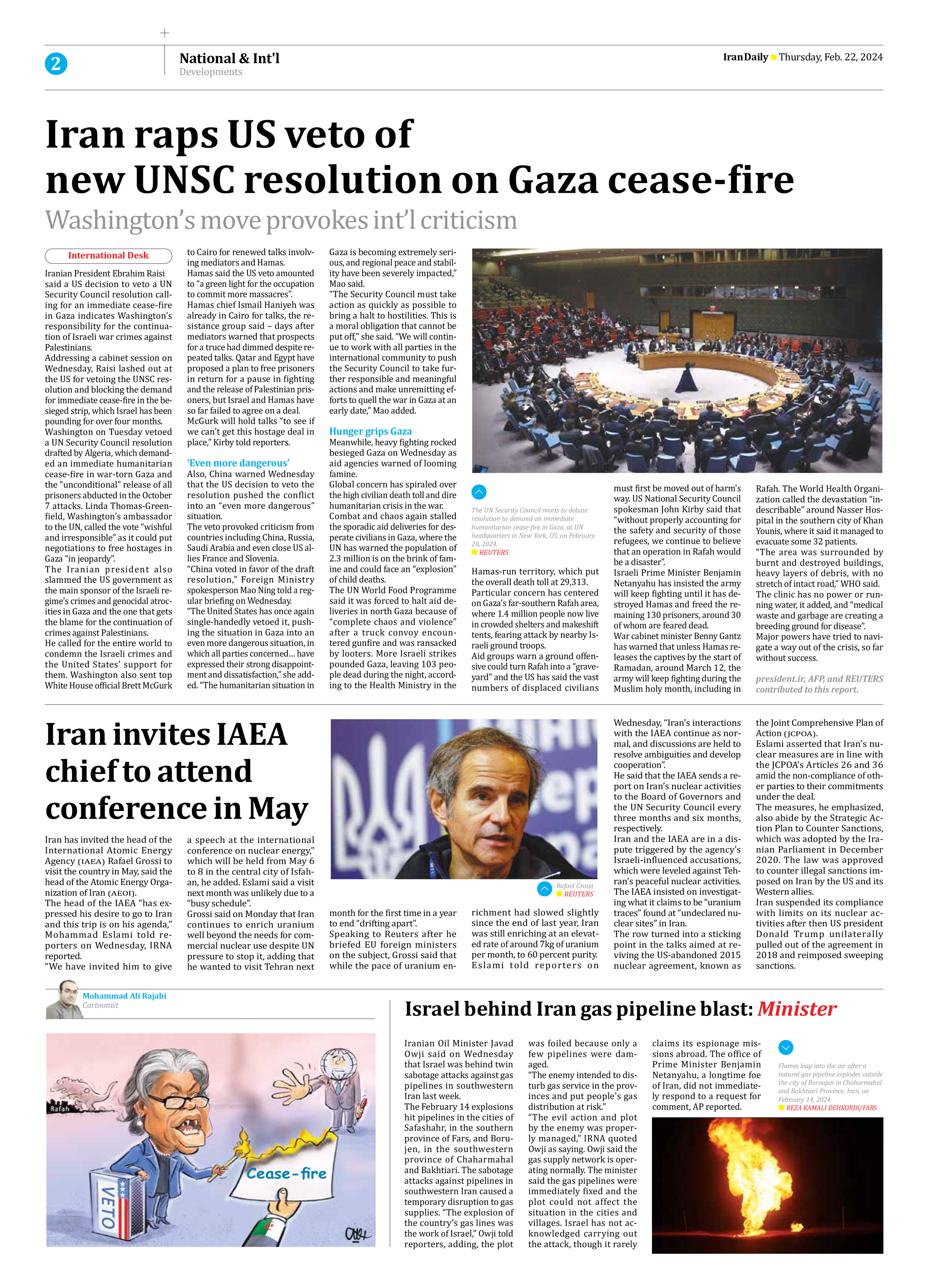
Iran raps US veto of new UNSC resolution on Gaza cease-fire
Washington’s move provokes int’l criticism
Iranian President Ebrahim Raisi
said a US decision to veto a UN Security Council resolution calling for an immediate cease-fire in Gaza indicates Washington’s responsibility for the continuation of Israeli war crimes against Palestinians.
Addressing a cabinet session on Wednesday, Raisi lashed out at the US for vetoing the UNSC resolution and blocking the demand for immediate cease-fire in the besieged strip, which Israel has been pounding for over four months.
Washington on Tuesday vetoed a UN Security Council resolution drafted by Algeria, which demanded an immediate humanitarian cease-fire in war-torn Gaza and the “unconditional” release of all prisoners abducted in the October 7 attacks. Linda Thomas-Greenfield, Washington’s ambassador to the UN, called the vote “wishful and irresponsible” as it could put negotiations to free hostages in Gaza “in jeopardy”.
The Iranian president also slammed the US government as the main sponsor of the Israeli regime’s crimes and genocidal atrocities in Gaza and the one that gets the blame for the continuation of crimes against Palestinians.
He called for the entire world to condemn the Israeli crimes and the United States’ support for them. Washington also sent top White House official Brett McGurk to Cairo for renewed talks involving mediators and Hamas.
Hamas said the US veto amounted to “a green light for the occupation to commit more massacres”.
Hamas chief Ismail Haniyeh was already in Cairo for talks, the resistance group said – days after mediators warned that prospects for a truce had dimmed despite repeated talks. Qatar and Egypt have proposed a plan to free prisoners in return for a pause in fighting and the release of Palestinian prisoners, but Israel and Hamas have so far failed to agree on a deal.
McGurk will hold talks “to see if we can’t get this hostage deal in place,” Kirby told reporters.
‘Even more dangerous’
Also, China warned Wednesday that the US decision to veto the resolution pushed the conflict into an “even more dangerous” situation.
The veto provoked criticism from countries including China, Russia, Saudi Arabia and even close US allies France and Slovenia.
“China voted in favor of the draft resolution,” Foreign Ministry spokesperson Mao Ning told a regular briefing on Wednesday.
“The United States has once again single-handedly vetoed it, pushing the situation in Gaza into an even more dangerous situation, in which all parties concerned… have expressed their strong disappointment and dissatisfaction,” she added. “The humanitarian situation in Gaza is becoming extremely serious, and regional peace and stability have been severely impacted,” Mao said.
“The Security Council must take action as quickly as possible to bring a halt to hostilities. This is a moral obligation that cannot be put off,” she said. “We will continue to work with all parties in the international community to push the Security Council to take further responsible and meaningful actions and make unremitting efforts to quell the war in Gaza at an early date,” Mao added.
Hunger grips Gaza
Meanwhile, heavy fighting rocked besieged Gaza on Wednesday as aid agencies warned of looming famine.
Global concern has spiraled over the high civilian death toll and dire humanitarian crisis in the war.
Combat and chaos again stalled the sporadic aid deliveries for desperate civilians in Gaza, where the UN has warned the population of 2.3 million is on the brink of famine and could face an “explosion” of child deaths.
The UN World Food Programme said it was forced to halt aid deliveries in north Gaza because of “complete chaos and violence” after a truck convoy encountered gunfire and was ransacked by looters. More Israeli strikes pounded Gaza, leaving 103 people dead during the night, according to the Health Ministry in the Hamas-run territory, which put the overall death toll at 29,313.
Particular concern has centered on Gaza’s far-southern Rafah area, where 1.4 million people now live in crowded shelters and makeshift tents, fearing attack by nearby Israeli ground troops.
Aid groups warn a ground offensive could turn Rafah into a “graveyard” and the US has said the vast numbers of displaced civilians must first be moved out of harm’s way. US National Security Council spokesman John Kirby said that “without properly accounting for the safety and security of those refugees, we continue to believe that an operation in Rafah would be a disaster”.
Israeli Prime Minister Benjamin Netanyahu has insisted the army will keep fighting until it has destroyed Hamas and freed the remaining 130 prisoners, around 30 of whom are feared dead.
War cabinet minister Benny Gantz has warned that unless Hamas releases the captives by the start of Ramadan, around March 12, the army will keep fighting during the Muslim holy month, including in Rafah. The World Health Organization called the devastation “indescribable” around Nasser Hospital in the southern city of Khan Younis, where it said it managed to evacuate some 32 patients.
“The area was surrounded by burnt and destroyed buildings, heavy layers of debris, with no stretch of intact road,” WHO said.
The clinic has no power or running water, it added, and “medical waste and garbage are creating a breeding ground for disease”.
Major powers have tried to navigate a way out of the crisis, so far without success.
president.ir, AFP, and REUTERS contributed to this report.







